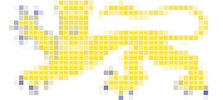Deep neural network (NN) training and inference often require substantial computational resources and power-hungry specialized hardware (e.g. GPU). To address this challenge, binary weight NN have been proposed. They can achieve remarkable results while using significantly fewer computational resources. Nonetheless, training these networks remains difficult due to the derivative of the sign function being equal to 0 almost everywhere. A promising solution involves using a model based on mathematical morphology (MM), which, under certain conditions, holds the potential achieve lossless binarization of ConvNets. These conditions are often difficult to meet in practical settings. We propose a robust theoretical framework for ConvNets binarization using MM, introducing two novel approximation methods. We verify empirically that our model can learn any sequence of morphological networks, and investigate its behaviour on a classification task.
- Poster

 PDF version
PDF version

